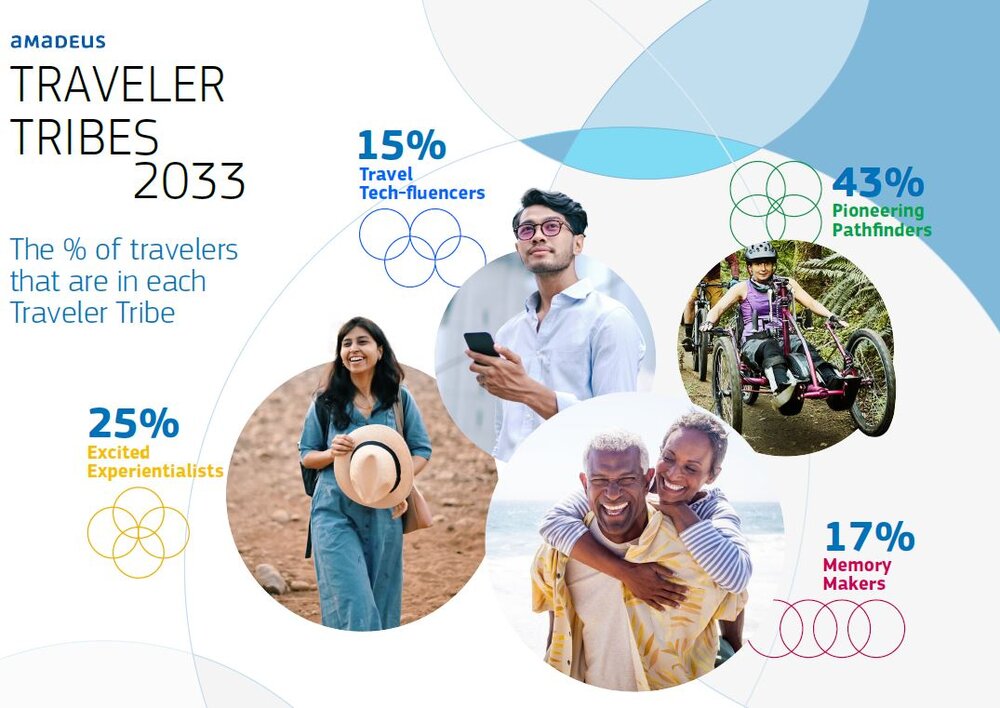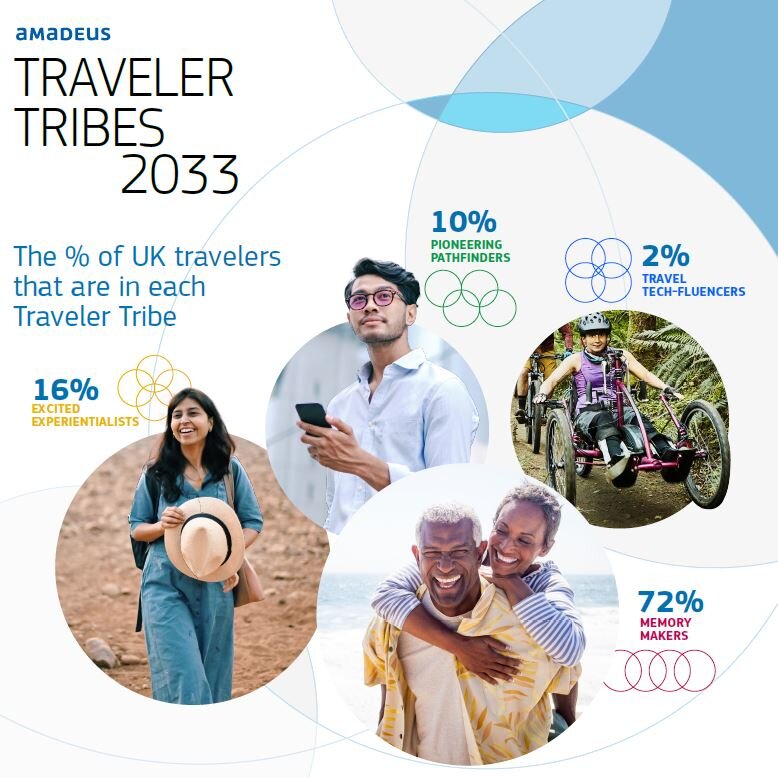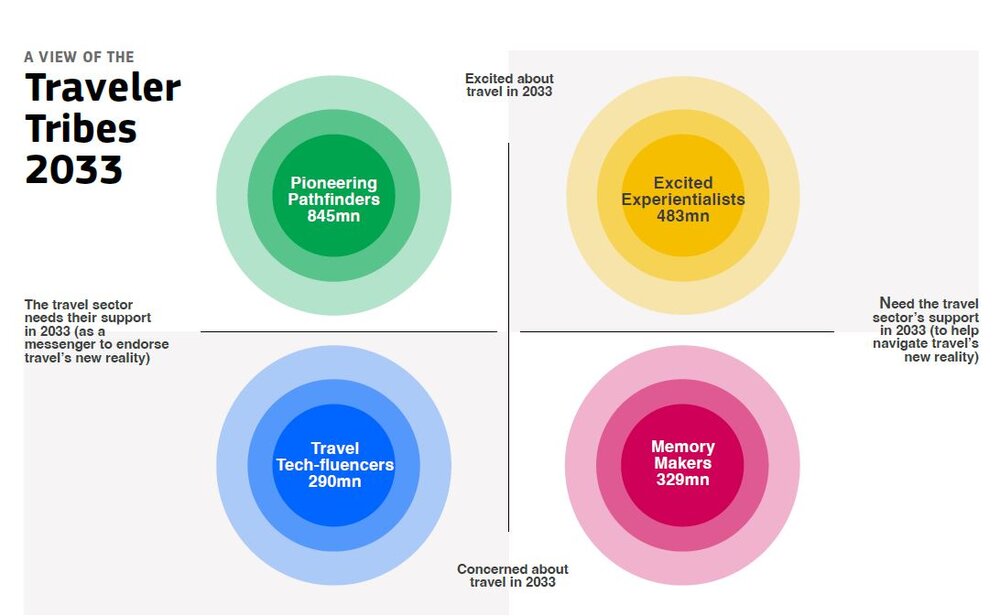A third edition of the Traveller Tribes report by the GDS and European technology giant studied attitudes to what travel will be like in 2033
_w=800_h=542_pjpg.jpg?v=20230522122229)
UK travellers concerned about affordability and sceptical about tech, Amadeus study finds
UK travellers are among the most concerned about the affordability of travel and the impact of technology in the future and but much more focused on making lifelong memories.
Latest global research from GDS and European travel technology giant Amadeus has identified four key Traveller Tribes that will shape the future of the industry from 2033.
The latest study builds on similar research conducted by Amadeus in 2006 and 2015 collating survey responses from 10,000 people alongside expert insights travel and non-travel insights.
This year’s report focuses the near future and draws conclusions from how people say they will travel in 2033 and 215 psychological traits that underpin how they make decisions.

Globally, the largest of the four tribes (43%) that emerged from analysis of 5.8 billion data points were Pioneering Pathfinders, characterised by their desire for adventure, adoption of new tech and payment methods and sense of personal responsibility to the environment.
Travel Tech-fluencers, often younger business travellers, represented just 15% of the total, Excited Experientialists 25%, and older, more conservative Memory Makers, who are more suspicious of new technology and daunted by the future, were 17% of the total.
However, results from the 744 UK travellers surveyed painted a very different picture with 72% found to be Memory Makers, 16% Excited Experientialists, 10% Pioneering Pathfinders and just 2% Travel Tech-fluencers.
For these respondents, when asked to list most important things about travel, the top five were the memories they make, the people they travel with, the places they visit, value for money, and enjoying an experience they have planned themselves.
Asked what excites them most about travel in the future, they said it will be quicker, there will be ways to remember trips more vividly, more environmentally friendly travel, that technology will reduce problems, and sampling holidays using Virtual Reality.
The five things that most concerned them about future travel were that it would be unaffordable, cyberattacks, security of data, political instability preventing travel and prices going up because of the need to be more environmentally aware.
Despite the reticence about technology this group was prepared to use it if helps them plan and experience their holidays with less hassle and de-risk the decision process.

The technologies they said will most interest travellers in 2023 were using data to create relevant trips, virtual reality previews, comprehensive trip planning apps, biometrics to improve the travel experience, and paying with cryptocurrency or facial recognition.
Decius Valmorbida, president, travel at Amadeus said:“As an industry we want to build travel experiences that are both inspiring and inspired.
“And we can only do that by understanding what travellers want now and into the future. As we look ahead, it is clear that what the Excited Experientialist will require will be different from that of the Memory Maker.
“As technology advances through AI, biometrics and the Metaverse, we are able to deliver more tailored journeys that meet the needs of different types of travellers – whether it is the desire for speed, comfort, reassurance or excitement.
Paco Pérez-Lozao Rüter, president, hospitality, added: “Travel is about the places we stay, the destinations we visit, the experiences we have. It’s important for many of us that when we travel we have a positive impact on the places we visit, and that is likely to increase.
“Our preferences as travellers continue to evolve, and this study gives us a glimpse into the future. We have different needs depending on the trip, who we’re traveling with and what we are looking for.
“The challenge for the industry is to adapt to people’s changing preferences, ensuring that destinations and places deliver what travellers want.”
The full Traveller Tribes report can be downloaded from now from the Amadeus website.
 The four Amadeus 2033 Traveller Tribes
The four Amadeus 2033 Traveller Tribes
Excited Experientialists This group has a ‘try it and see’, ‘you only live once’ approach to life and travel. 44% are without children and have a mid- to high-income job with flexible working options, which enables them to readily explore the world.
They are more likely than other travellers to act on instinct, making them 2033s ‘anti-planners’, favouring less predictable and more exciting accommodation experiences.
They are also open to technology that helps them speed up certain aspects of their journey, with many expecting to use artificial intelligence (AI) in the airport environment.
Memory Makers This group takes a more simplified approach to travel: to make memories and visit places. 44% are aged 42 and over and are habitual in their travel behaviors. The future can be a daunting prospect for them.
They put people first and place less value on technology and sustainability, reassured by existing methods. However, despite their scepticism about technology, they are excited about virtual reality (VR) and augmented reality (AR) preview tours with the majority expected to use VR tours before purchasing a trip.
Travel Tech-fluencers This group includes today’s young business travellers with a forward-looking perspective on life. 48% of the group are under the age of 32 and their perspective is symbolised by how much technology they own.
However, there is a discord when it comes to what excites and concerns them around the future of technology and travel. While many want to travel sustainably, it seems they are more conscious about sustainability options around their method of travel, rather than where they’ll be staying.
Pioneering Pathfinders Individuals inthis group live a fast-paced life, always looking for their next adventure. Their life is in full swing with 82% between the ages of 23 and 41.
They like to plan but are not afraid of risk and are open to new experiences. This group is more willing than others to let sustainability influence their decisions. They will also be very comfortable using all forms of alternative payment methods in 2033, whether via cryptocurrency or within a virtual reality environment.



